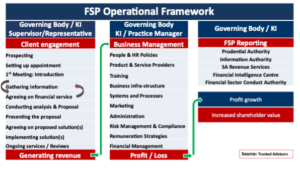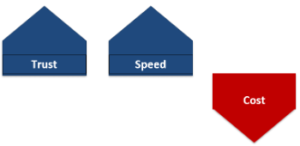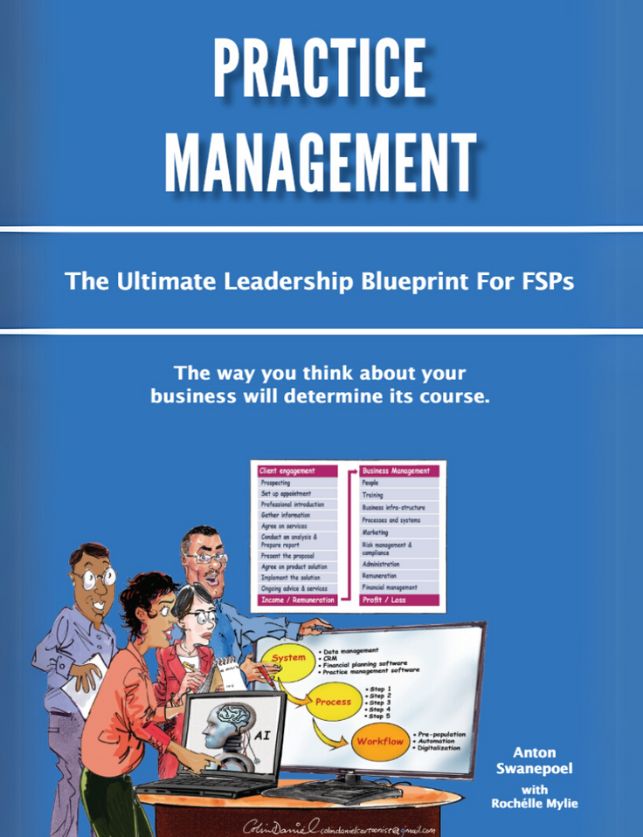Over the last two decades, I have become increasingly fascinated by the challenges that financial service providers (FSPs), key individuals and representatives had to face in their businesses over the years, and the trials that they still face daily. With COFI initiatives being revived in the latter part of 2024, it is going to take an incredibly special person to continue with managing a small independent practice successfully in the future.
It is for this reason that I have embarked on a yearlong project to write a practice management book, titled, Practice Management, the ultimate leadership blueprint for FSPs. My objective with this book is to offer a comprehensive practice management guide for FSPs, especially for key individuals and representatives of small to medium-sized FSPs. I have the wonderful privilege of introducing the book to industry in this article by giving you, the reader, a brief overview of what the publication is all about.
Introduction
There are many underlying components in every advisory practice, like a jigsaw puzzle. Unlike a puzzle, effective practice management is always going to be a work in progress, never fully complete, because changes in the market and legislation as well as technological enhancements can disrupt FSPs’ businesses on an ongoing basis.
In this new publication, I identify all the key components (pieces of the practice management puzzle) of an FSP, large or small, that will contribute to the sustainability of advisory businesses in the future. Most of the key components of an FSP practice are based on business principles that are timeless, which will help you to lay a sound foundation for your practice, whether it be under FAIS or COFI. This will benefit readers in many ways, but one significant benefit can be found in one of the comments that the founder of Amazon, Jeff Bezos, made about principles that are timeless. He said:
“I very frequently get the question: ‘What’s going to change in the next 10 years?’ And that is a very interesting question; it’s a very common one. I almost never get the question: ‘What’s not going to change in the next 10 years?’ And I submit to you that the second question is actually the more important of the two – because you can build a business strategy around the things that are stable in time.”
Years of surveys, formal and informal show that the following operational framework and underlying components of FSPs have been “stable in time”, to use the words of Bezos:

Twenty of the 53 chapters in the book deal with the leadership approach and operational components of leading FSPs and one can say that the illustration above highlights the importance of the heart and mind of successful FSPs. The heartbeat of an FSP deals with its values, culture and client engagement process, because the heart pumps blood through your veins and keeps the body going. Winning clients and retaining them for the FSP earns revenue for the business and keeps funding business development that will sustain the FSP. Your values and culture do for FSPs what good exercise does for the body. The brains deal with leadership strategies, effective management and appropriate allocation of capital in the business to ensure that FSPs remain profitable.
Strategy
There is an exceptionally good chance that COFI will be promulgated in 2025, and when that happens, FSPs will seriously have to consider one or more strategic planning sessions to make sure that their foundations are laid firm and that they are well-positioned for the future. Existing business strategies may have to be stress-tested, and some may even need a serious face-lift. Practice Management, the ultimate leadership blueprint for FSPs, can be used in every practice as a guide for strategic planning purposes in 2025 and beyond. The book, scheduled for publication on Monday, 3 February 2025, features research from the best business minds in the world and lessons learned from 2024’s 50 most admired companies in the world. One of the timeless business principles that most successful and admired companies tend to focus on is customer obsession, articulated so well by Jeff Bezos:
“Amazon’s first and most important guiding principle is customer obsession. For Amazon it means that leaders start with the customer and work backwards.”
FSP leaders will do well in the years that follow to go beyond merely treating customers fairly and focusing on blowing their customers’ socks off with their value propositions. Working vigorously to earn and keep customers’ trust should be one of the most important strategic objectives of FSPs for 2025 and beyond. The WHY is simple. Trust is the only thing that will sustain your FSP under any circumstances. WHAT to do and HOW to do it consistently well requires serious planning.
Lack of Capacity
The book also contains a particularly important chapter on the need to optimise your systems and technology. The reality is that most FSPs struggle with the lack of capacity and most FSP stakeholders are over-extended. There are two key aspects in every business that can free up capacity, namely:
The speed of trust

In his bestselling book, The Speed of Trust, Stephen MR Covey concluded that “the higher the trust, the quicker things happen, at a lower cost”.
In his book, there are case studies that prove his theory, and I have witnessed this principle play out in practice many times.
Systems
What every FSP needs in a complex, competitive and onerous environment is to scale their operations effectively and efficiently. As your client base grows, technology can accommodate increased data volumes and more complex client scenarios without a proportional increase in manual workload or significant additional cost. Poor systems will have the opposite effect as stated by W Edwards Deming, professor, author, lecturer and management consultant:
“If you put good people in bad systems, you get bad results.”
While many FSPs do have good systems in place, very few have managed to convince all their key individuals, representatives and administrators to embrace their processes and systems fully. If you put good people into good systems but poorly embraced, you will also get poor results. The second aspect that FSPs will simply have to implement in 2025 is to change the mindset of representatives and administrators pertaining to their adoption of their FSP system.
Conclusion
The book, Practice Management, the ultimate leadership blueprint for FSPs provides insights that will help you in your strategic planning and decision-making processes in 2025 and beyond. Another unique feature of this publication is that 60 leading industry stakeholders have participated in the publication, offering the reader a comprehensive range of value propositions from world-class product and service providers. Their contributions to the book also made it possible for this business manual to be made available electronically at no cost to every key individual, advisor and intermediary in South Africa. Happy reading and wishing all of you the best for 2025.

Download your complimentary copy of ‘Practice Management– The Ultimate Leadership Blueprint for FSPs’ Here:










